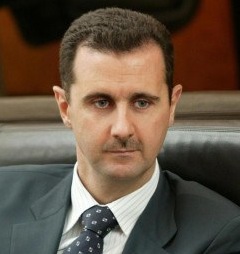
The Islamic Republic, which claims to be the leading opponent of chemical weapons because it has suffered the most from them, last week tried to block a joint Russian-American criticism of the use of chemical weapons in Syria.
The Iranian move suggests the extent to which the Islamic Republic has tied itself to the regime of Syrian President Bashar Al-Assad, even while it violates what Iran claims to be among its highest principles.
Foreign Policy magazine reported that Iran tried to block the adoption of a mildly worded statement by the executive council of the Organization for the Prohibition of Chemical Weapons (OPCM). Jointly sponsored by Russia and the United States, the statement expressed “serious concern” about the likely use of chlorine as a weapon in Syria. It didn’t say who used the weapons.
The measure would also have authorized the agency’s chief to report to the UN Security Council on his agency’s investigation into the use of chlorine on the Syrian battlefields.
Tehran’s delegation at the OPCW headquarters in The Hague objected to the US-Russian draft, which was approved last Wednesday by the 41 members of the OPCW’s executive council’s with only Iran objecting, Foreign Policy said.
Normally, that single-country objection would have been enough to kill off the measure at the OPCW, which has traditionally made its decisions unanimously. But, in an unprecedented move, the United States demanded that the OPCW’s executive council vote on the statement, thereby isolating Tehran.
The vote pulled the rug out from under the Iranian delegation, making it clear that Tehran would not be able to protect Syria at The Hague.
Foreign Policy magazine said, “Tehran’s gambit underscored Iran’s role as Syria’s most important political benefactor and military backer, surpassing Moscow as Assad’s go-to government for international cover.”
The OPCW has declared success in eliminating most of Syria’s chemical weapons. In a statement last week, OPCW said the international community had destroyed 98 percent of Syria’s declared chemical weapons arsenal, including stores of sulfur mustard gas and methyl-phosphonyl difluoride — a key precursor for the nerve agent sarin — which were destroyed aboard an American naval vessel in the Mediterranean.
Late last month, Syria destroyed an underground structure that had previously housed a chemical weapons facility, the first of 12 scheduled for destruction. While questions remain about whether Syria may have hidden some chemical weapons in secret hiding places, diplomats and arms control specialists say much of Assad’s ability to use chemical weapons has been eliminated.
Despite such efforts, Foreign Policy said Assad “has still found ways of using chemicals to kill his own people.” The newest weapon of choice is chlorine, a common industrial chemical best known as a swimming pool and clothing cleaner. Unlike mustard gas and sarin, chlorine is not subject to any international controls, though its use as a chemical weapon is banned by the 1993 Chemical Weapons Convention.
The OPCW said that interviews conducted outside Syria with dozens of eyewitnesses, emergency workers, doctors, and nurses provided extensive evidence of chlorine’s use on the battlefield.
The OPCW has no mandate to assign responsibility for chemical weapons attacks and has never blamed either side. But US and other officials say the fact that the poisonous gas was delivered by helicopters, which are used exclusively by the Syrian government, points the finger squarely at Assad.
For months, the United States worked to persuade Ahmet Uzumcu of Turkey, the OPCW’s director general, to forward the OPCW reports to the UN Security Council, the only world body with the authority to punish a country for using chemical weapons.
He demurred, citing a lack of a mandate and the OPCW’s tradition of maintaining complete confidentiality over its work, according to diplomatic sources. On December 30, the United States, joined by seven other Security Council members, bypassed Uzumcu and formally presented three OPCW reports to the council.
Russia, which has largely tried to shield Syria from threats at the Security Council, protested the move in a closed-door meeting of the Security Council early last month.
But in recent weeks, Foreign Policy reported, the United States and Russia quietly reached agreement on a proposal that would make it easier for the OPCW’s leader to forward any future reports on the use of chlorine to the council.
Foreign Policy said, “Diplomats tracking the issue said it remains unclear whether Russia backed the move in order to increase pressure on Syria to rein in its use of chlorine on the battlefield or has merely been engaging in an exercise in damage control.”
It said Moscow might be supporting the statement because it would leave it to Uzumcu, not member states, to decide whether to share his agency’s findings with the council. But Tehran clearly sees the Russian-American policy as opening a door it doesn’t wish to see opened.
The Iranian delegation argued that it was premature to confront Syria over the use of chlorine, and therefore said it could not back the US-Russian accord. Hamid Babaei, a spokesman for the Iranian mission to the United Nations, told Foreign Policy Tehran “believes that insistence on adopting a decision by the executive council merely serve the aims of specific countries and does not properly address the situation.”
But it leaves Iran standing out—hypocritically in the eyes of many—as the lone member of the OPCW executive committee that isn’t at least “concerned” about the use of chemical wagons in Syria.
